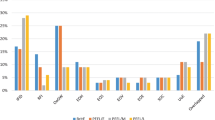Abstract
This study analyzed compliment responses (CRs) of Filipino male and female ESL students through a discourse completion task (DCT) adapted from Tang and Zhang (J Pragmat 41:325–345, 2009) on four situational topics of appearance, character, ability, and possession (Manes and Wolfson in The compliment formula: conversational routine, Mount Publishers, Amsterdam, 1981; Wolfson in: Wolfson, Judd (eds) Sociolinguistics and language acquisition, Newbury House, Rowley, MA, pp 82–95, 1983; Holmes in Anthropol Linguist 8:485–508, 1986). The 807 CRs elicited were categorized into Holmes’ (J Pragmat 12(3):445–465, 1988; J Pragmat 20(2):91–116, 1993) three-way macro-level CRs of accept, reject, and evade and their micro-level CRs. Focus group discussions (FGDs) were also conducted to supplement and corroborate data from the DCT. Results showed an overwhelming number of CRs of accepting compliments (Cs) of both male and female contrary to findings in studies of other Asian speakers in China, Taiwan, Japan, and Vietnam who generally rejected and downgraded Cs (Chen in J Pragmat 20(1):49–75, 1993; Baba in A study of interlanguage pragmatics: compliment responses by learners of Japanese and English as a second language, 1996; Tran in The nature and conditions of pragmatic discourse investigated through naturalized role-play, Lincom Europa, Muenchen, 2006; Yu in Mod Lang J 88(1):102–119, 2004), and also similar to English native speakers who generally accepted Cs (Chen 1993; Herbert in Am Speech 61(1):76–88, 1986). A preponderance of data, however, showed a peculiar Filipino way of accepting then underplaying the effect of accepting Cs through combination and modification strategies that avoid self-praise. Ability to do this is only possible with relatively adequate linguistic repertoire that make ESL learners pragmatically and communicatively competent. It is hypothesized that this language tendency also has an L1 culture connection.
Similar content being viewed by others
References
Austin, J. L. (1962). How to do things with words. Cambridge, MA: Harvard University Press.
Baba, J. (1996). A study of interlanguage pragmatics: Compliment responses by learners of Japanese and English as a second language. Unpublished doctoral dissertation, The University of Texas at Austin.
Chen, R. (1993). Responding to compliments: A contrastive study of politeness strategies between American English and Chinese speakers. Journal of Pragmatics, 20(1), 49–75.
Cheng, D. (2011). New insights on compliment responses: A comparison between native English speakers and Chinese L2 speakers. Journal of Pragmatics, 43, 2204–2214.
Doohan, E., & Manusov, V. (2004). The communication of compliments in romantic relationships: An investigation of relational satisfaction and sex differences in compliment behavior. Western Journal of Communication, 68(2), 170–194.
Herbert, R. (1986). Say “thank you”—Or something. American Speech, 61(1), 76–88.
Herbert, R., & Straight, S. H. (1989). Compliment-rejection versus compliment-avoidance: Listener-based versus speaker-based pragmatic strategies. Language & Communication, 9(1), 35–47.
Holmes, J. (1986). Compliments and compliment responses in New Zealand English. Anthropological Linguistics, 8, 485–508.
Holmes, J. (1988). Paying compliments: A sex-preferential positive politeness strategy. Journal of Pragmatics, 12(3), 445–465.
Holmes, J. (1993). New Zealand women are good to talk to: An analysis of politeness strategies in interaction. Journal of Pragmatics, 20(2), 91–116.
Holmes, J., & Brown, D. F. (1987). Teachers and students learning about compliments. TESOL Quarterly, 21, 523–546.
Hymes, D. (1972). On communicative competence. In J. B. Pride & J. Holmes (Eds.), Sociolinguistics. Harmondsworth: Penguin.
Jaworski, A. (1995). “This is no an empty compliment!” Polish compliments and the expression of solidarity. International Journal of Applied Linguistics, 5, 63–94.
Kaut, C. R. (1961). Utang na loob: A system of contractual obligation among Tagalogs. Southwestern Journal of Anthropology, 18(3), 256–272.
Manes, J., & Wolfson, N. (1981). The compliment formula: Conversational routine. Amsterdam: Mount Publishers.
Murillo, P. P. (2012). An analysis of compliment responses by Australian and Latin American women. Griffith Working Papers in Pragmatics and Intercultural Communication, 5(1), 38–45.
Pe-Pua, R., & Protacio-Marcelino, E. (2000). Sikolohiyang Pilipino (Filipino psychology): A legacy of Virgilio G. Enriquez. Asian Journal of Social Psychology, 3, 49–71.
Pomerantz, A. (1978). Compliment responses: Notes on the co-operation principle of multiple constraints. In J. Schenkein (Ed.), Studies in the organization of conversational interaction. New York, NY: Academic Press.
Searle, John R. (1969). Speech acts. Cambridge: Cambridge University Press.
Searle, John R. (1979). Expression and meaning: Studies in the theory of speech acts. Cambridge: Cambridge University Press.
Tang, C., & Zhang, G. Q. (2009). A contrastive study of compliment responses among Australian English and Mandarin Chinese speakers. Journal of Pragmatics, 41, 325–345.
Tran, G. Q. (2006). The nature and conditions of pragmatic discourse investigated through naturalized role-play. Muenchen: Lincom Europa.
Wang, Y., & Tsai, P. (2003). An empirical study on compliments and compliment response in Taiwan mandarin conversation. Concentric: Studies in English Literature and Linguistics, 29(2), 118–156.
Wierzbicka, A. (1985). Different cultures, different languages, different speech acts. Journal of Pragmatics, 9, 145–178.
Wolfson, N. (1983). An empirically based analysis of complimenting behavior in American English. In N. Wolfson & E. Judd (Eds.), Sociolinguistics and language acquisition (pp. 82–95). Rowley, MA: Newbury House.
Yousefvand, Z. (2010). Study of compliment speech act realization patterns across gender in Persian. Arizona Working Papers in SLA and Teaching, 17, 91–112.
Yu, M. (2004). Interlinguistic variation and similarity in second language behavior. The Modern Language Journal, 88(1), 102–119.
Acknowledgements
This research was funded by Silliman University Research Development Center (RDC) headed by Dr. Enrique G. Oracion.
Author information
Authors and Affiliations
Corresponding author
Appendix
Appendix
A Discourse Completion Task (DCT) on Compliment Responses (CRs)
Tang and Zhang (2009)
We greatly appreciate your time and effort in providing information for our research on compliment responses. Thank you very much for participating.




Rights and permissions
About this article
Cite this article
Mascuñana, E.F., Patron, M.J.T., Caturay, W.S. et al. Compliment Responses by College Male and Female Filipino Second Language Learners of English. Corpus Pragmatics 3, 67–91 (2019). https://doi.org/10.1007/s41701-018-00048-3
Received:
Accepted:
Published:
Issue Date:
DOI: https://doi.org/10.1007/s41701-018-00048-3




